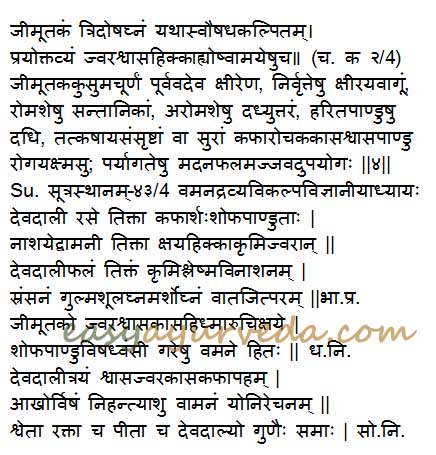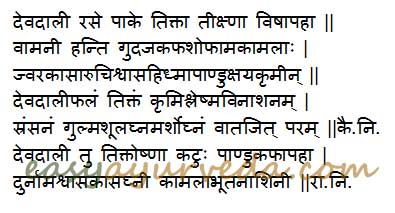Luffa echinata: Uses, Dose, Research, Side Effects
Bitter Sponge – Luffa echinata is an ayurvedic herb used in the treatment of jaundice, rhinitis, skin diseases, cough, for inducing purgation, diseases of the liver and during difficulty in labor to dilate the uterus. It is called Devadali in Sanskrit.
Botanical Name- Luffa echinata Roxb.
Family- Cucurbetaceae ( Kosatakin kula)
Table of Contents
Vernacular names
Names in different languages:
Hindi Name- Bindal, Ghagharbel, Kakoda
English Name- Bristly Luffa, Bitter luffa, Rag gourd
Bengali Name- Deyatada
Gujarati Name- Kukurvel
Kannada Name- Daivadali
Marathi Name- Devadangari
Tamil Name- Peypirkku
Telugu Name- Panibira
Uses
Uses of Luffa echinata (Bristly Luffa):
- The paste of the fruits is applied over the pile mass to reduce the size of the external piles and dry it.
- The drops of the flowers and fruit are applied through the nostril as ‘nasya’ to treat jaundice, rhinitis, sinusitis and headache.
- The decoction of the fruit is given in a dose of 15-20 ml to treat dyspnea, cough and respiratory diseases.
- The decoction of the fruit is given in a dose of 20-25 ml to treat urinary tract infections and difficulty in micturition.
- The decoction of the fruit and whole plant is given to treat dysmenorrhea and difficulty during the last stages of labor.
- The cold infusion of the plant is given in a dose of 30-40 ml to treat fever.
- The fresh juice of the fruit and whole plant is given to induce emesis and purgation in cases of ingested poison.
- The powder of the plant is given in doses of 3-5 g to treat diseases of the liver and spleen.
- The decoction of the plant is given in a dose of 50-60 ml to treat ascites, intestinal worms and ingested poison.
- The decoction of the fruit is given in a dose of 25-30 ml to treat skin diseases like eczema, ringworm.
- The plant is a blood purifier and hence its decoction is given to purify the blood.
- The root and fruit juice is used as nasal drops by some folklore medicine practitioners, which leads to incresed secretion from eyes and nose, and also causes purgation.
Properties, part used, dosage
Luffa echinata – medicinal Properties:
Rasa (Taste) – Katu (Pungent), Tikta (Bitter)
Guna (Qualities) – Laghu (Light for digestion), Ruksha (Cause dryness)
Veerya (Properties) – Ushna (Hot in potency)
Vipaka –Katu (Undergoes Pungent taste after digestion)
Karma (Action) – Tridosahara (Pacifies all the dosha), Vamaka (Induces Emesis), Vishagna (Controls the poisonous effect)
Part used– Fruit, Flowers
Dosage- Powder 1-3 g
Juice 10-15 ml
Bitter Sponge Home Remedies
By Dr M S Krishnamurthy MD(Ayu) PhD (Ayu)
Devadali is an Ayurvedic herb used for inducing therapeutic Vamana (emesis) and Virechana (purgation) Panchakarma. This action is called ‘Ubhayato bhagahara’.
Home remedies
Jaundice, headache
1. Seed cold infusion errhine (nasya) for jaundice and headache:
The seeds or fruit are soaked in a cup of water and kept overnight. This is squeezed well and cold infusion obtained is used to instill into the nostrils in the dose of 2-3 drops once in a day, early in the morning, preferably in empty stomach. This leads to mild purgation and vomiting followed with profuse nasal discharge. This recipe is effective in jaundice and headache conditions.
Wounds
2. Hot infusion or decoction of the plant for wound washing:
The dried plants are taken and its decoction or hot infusion is made. This is used to wash the wounds and ulcers.
Alcoholic liver disease
3. Fine powder of the seed for gaseous tumors and alcoholic liver disorders:
Seeds are soaked in cow’s urine or fresh juice of ash gourd for 3-4 hours. Later it is made into fine paste and kept for drying (under the sunshine).This powder is administered in the dose of 125-250 mg along with honey, sugar cane juice or jaggery water. This is effective in gaseous tumors and alcoholic liver disorders.
Abdominal worms
4. Hot infusion of the plant for abdominal worms:
Hot infusion of the plant (dried) is administered in the abdominal worms of the adults, in the dose of 20-30 ml. This gives significant benefits, if the medication is continued for 5-6 days.
Devadali is hot in potency and penetrative in action. It should not be administered to pregnant and young and old aged people. Also, the patients who are suffering from debility, abdominal ulcers, fatigue etc. should avoid this. “ Proper dose of the substance determines the action of the drug as medicine and poison”-This famous quote appears 100% true with respect to the herbal drug Devadali.
Click to consult Dr MS Krishnamurthy MD (Ayu), PhD (Ayu)
Chemical constituents
The fruit of Luffa echinata contains chrysoeriol and its glycosides as principal flavonoids. The seeds contain cucurbitacin B, triterpene alcohols, echinatin and sapogenin.
Sanskrit verse


Ayurvedic uses of Luffa echinata:
Sramsana – mild laxative
Indications:
Jwara – fever
Shwasa – asthma and chronic respiratory disorders
Hikka – hiccups
Arochaka – anorexia
Pandu – anemia
Rajayakshma – Chronic Respiratory disorder
Arsha – hemorrhoids – due to Kapha aggravation
Shopha – inflammation
Kshaya – depletion of body tissues, weight loss, tuberculosis
Krumi – worm infestation
Gulma – Tumors of the abdomen
Shoola – abdominal colic pain
Akhuvisha – rat bite, rodent bite,
Visha – Toxic conditions, poisoning
Kamala – Jaundice, Liver diseases
Bhuta – psychiatric disorders, anti microbial
Luffa echinata fruit is
Tikta – bitter
Useful in
Krumi – worm infestation
Shleshma – Kapha disorders
Side effects, contraindications
Side effects and Contraindicated persons to consume Luffa echinata (Rag gourd):
People suffering from cardiac diseases should avoid taking devadali or its formulations as it causes emesis and sometimes purgation, during which it can exert more pressure on the cardiac muscles. Children, old age people and pregnant women also should avoid consuming devadali.
Interaction with medicines, supplements
Can this be used while taking Homeopathic medicine?
Yes. This product does not react with homeopathic medicine.
Can this medicine be continued while taking supplements like multivitamin tablets, Omega 3 fatty acids etc?
Yes. Generally, this product goes well with most dietary supplements. However, if you are taking more than one product per day, please consult your doctor for an opinion.
With western
medicines
Seek your
doctor’s advice if you are taking this product along with other western
(allopathic / modern) medicines. Some Ayurvedic herbs can interact with modern
medicine.
If both Ayurvedic and allopathic medicines are advised together, then it is
best to take Allopathic medicine first, wait for 30 minutes and then take the
Ayurvedic medicine.
Ayurvedic formulations
Formulations containing Devadali:
Abhaya lavana: It is an ayurvedic medicine used in the treatment of spleen and liver disorders. Care should be taken that patients should not take the preparation for a long duration as it can cause a decrease in sperm count.
Brahmi Drakshadi Kashaya: It is an ayurvedic medicine in decoction form given for the treatment of fever, burning sensation of the body and vata disorders like paralysis, neuralgia.
Formulations prepared from Devadali, needed for inducing emesis as part of poorvakarma for panchakarma therapy, are described in Kalpasthana of Charaka Samhita.
Research articles
Research articles on Devadali:
Hepato- protective action: The different extracts of the fruits of Luffa echinata Roxb. (Cucurbitaceae) were tested for their hepatoprotective activity against CCl(4) induced hepatotoxicity in albino rats. The degree of protection was measured by using biochemical parameters like serum glutamic oxalacetic transaminase (SGOT), serum glutamic pyruvate transaminase (SGPT), alkaline phosphatase (ALKP), total protein (TP) and total albumin (TA). The petroleum ether, acetone and methanolic extracts showed a significant hepatoprotective activity comparable with those of Silymarin.
Anti- arthritic action: The present study states the effect of the aqueous extract (LEFAE) and the alcoholic extract (LEFEE) of Luffa echinata Roxb. fruits on the Freund’s complete adjuvant (FCA) induced arthritic rat paw edema, body weight changes and alterations in haematological and biochemical parameters in both developing and developed phases of arthritis. The results of the current investigation concluded, ethanol extract of Luffa echinata Roxb. Fruit extract possesses a significant anti-arthritic activity against adjuvant induced arthritis and justifies its therapeutic role in arthritic condition. The observed antiarthritic activity may be due to the presence of phytoconstituents such as iridoid glycosides, alkaloids, phenolic compounds and flavonoids.
Treatment for human colon cancer:
These experiments suggest that LER has anticancer properties via inducing the apoptosis in colon cancer cells, which provided the impetus for further studies on the therapeutic potential of LER against human colon carcinoma.
Sanskrit synonyms
Synonyms-
Jeemoot, Gargari, Devatadak,
Vrittakosha- Fruit is of round shape
Veni, Jalini- The fruit is having soft needle like covering
Devadali is a climber having hairy soft stems found in the Northern states of India. The fruits are oval to round shape having soft, hairy covering.
Jeemutaka, Devatada,
AkhuVishaha – useful in treating rat bite, rhodent poisoning
Classical categorization
Charaka Samhita-
Vamana – group of herbs that are used for inducing vomiting, in Vamana Panchakarma therapy
Phalini- fruit group of herbs
Sushruta Samhita-
Urdwabagahara – group of herbs that are used for inducing vomiting
Ubhayatobagahara – group of herbs that are useful both in Vamana and Virechana therapies.
Kaiyyadeva Nighantu- Oushadhi varga
Dhanvantari Nighantu- Guduchyadi varga
Bhavaprakasha- Shaka varga
Raja Nighantu- Moolakadi varga
Shodala Nighantu- Guduchyadi varga
Scientific classification
Kingdom: Plantae
Order: Cucurbitales
Family: Cucurbitaceae
Genus: Luffa
Species: Echinata
Habitat, Variety
Habitat
The plants are commonly found in the states like Gujarat, Bihar, Uttara pradesh, West Bengal etc.
Variety:
Another botanical variety is Luffa graveolens Roxb and is similar in therapeutic action. The seeds are used more in clinical application. The whole plant can also be used; but with lesser benefits.
Author:
Dr.B.K.Prashanth M.D (Ayu), Ph.D
E mail: [email protected]
External – Its juice is applied on the wounds which cleanses the wound and promotes healing. It has a scraping action on the body. It is used for nasya purposes (sirovirechana nasya). Fruit powder can be used to apply on Hemorrhoids. In jaundice, Rhinitis, Epilepsy and kaphaja type of siroroga nasya it is used for nasya purpose.
Digestive System – In lower dose it has carminative, Liver stimulant, pitta releasing and Anthelmintic action, and is indicated in Ascites, Anemia, Poisonous conditions, Helminthiasis etc. Fruit is used for nasya purposes in Jaundice. In higher doses it has purgative, emetic property.
Circulatory System – , indicated in edema and blood borne diseases.
Respiratory system – Expels kapha dosha. useful in cough and in other respiratory illnesses.
Excretory system – Increases urine output. indicated in Dysuria.
Reproductive system – Uterine stimulant, (induce menstruation), indicated in Dysmenorrhea and in Delayed / prolonged labor.
Skin – beneficial in skin diseases.
Tapakrama – Antipyretic.
Satmikarana – Anti poisonous










